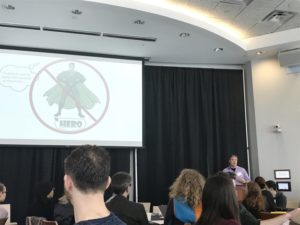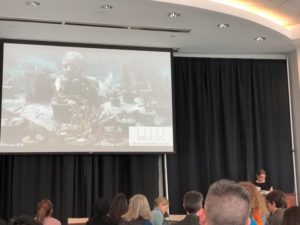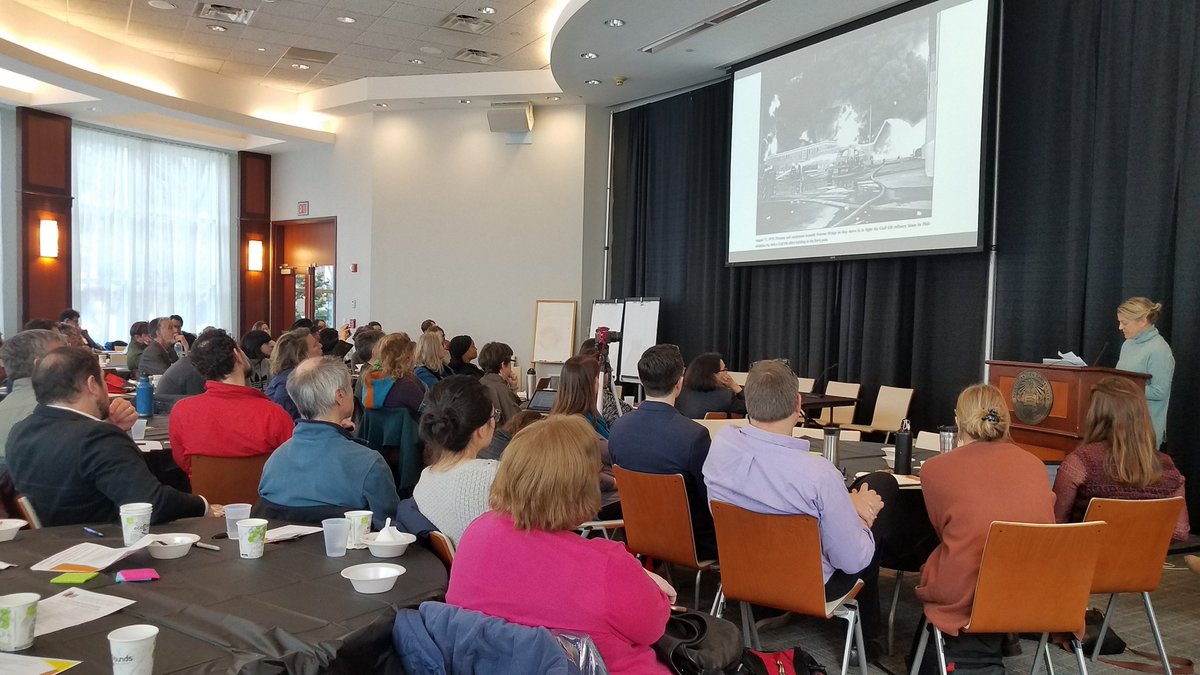On February 22nd, 2019, the Climate Change, Crisis, and Creativity Conference brought together a variety of internal and external stakeholders to discuss threats facing Northeastern and the greater community, and opportunities for resilience, in the face of climate change. The event was well attended and guests included

Lightning talk presenters sit on a panel for Q&A after their presentations.
NU faculty, staff, and students, as well as community members, specialists from nearby academic institutions, and invited speakers from around the country. The event hosts included several University departments including: the NULab for Texts, Maps, and Networks; the Department of English; the School for Public Policy and Urban Affairs; the Humanities Center; and the Global Resilience Institute.
Presentations throughout the day focused on the opportunity, and necessity, to create interdisciplinary momentum and grassroots initiatives to tackle the complex issues associated with climate change. The agenda kicked off with lightning talks from faculty, staff, and students in various departments across the University. NUMSC Faculty Brian Helmuth delivered an inspiring talk highlighting his climate resilience work with researchers at the University of Basrah in Iraq, reminding his audience of the importance of addressing the unconscious that we all harbor, as we come together to solve global societal and environmental problems. In another lightning talk, NUMSC Three Seas

NU Professor Brian Helmuth shares lessons on collaborative research and relationship building, learned via his decade-long partnership with Iraqi climate researchers.
Program Alumni, and staff at the Global Resilience Institute Kyla Van Maanen presented her idea for a project assessing the impact ofunderwater art installations, through an ecological, cultural, and environmental lens. Next, keynote speaker Bethany Wiggin of the University of Pennsylvania shared her work bringing climate data to the people, through citizen science projects, open sourced data, and other strategies.
Over lunch, a productive group discussion, led by the campus Sustainability and Resilience Advisory Team, invited internal and external community members to share their thoughts on what the University is doing well in this area, and where is there room for improvement. The discussion praised sustainability and resilience efforts happening in various departments across the University, but highlighted increased communication between these isolated departments, and between students, faculty, staff, and university leadership, as a major area for improvement. In the last few hours of the event, participants were treated to three moving presentations by artists who have used their skills to create art that communicates the science, severity, and urgency of the issues we are facing associated with climate change. Through visual art, song, and spoken word performance, participants were brought on an emotional and informative journey, exploring

NU alumni and staff Kyla Van Maanen is curious how underwater art installations might serve both ecological and educational roles.
climate issues through the creative lenses of the three artists: Carolina Aragón, Geoffrey Hudson, and Sarah Kanouse.
As the day ended, participants were filled with a sense of urgency to address the grave issues discussed throughout the day, but also a sense of hope and anticipation, for the initiatives already underway and soon to come, as we continue to build a more sustainable and resilient future together. For more information, the conference organizers have compiled a summary of the day with notes, links, and resources that can be accessed here.

